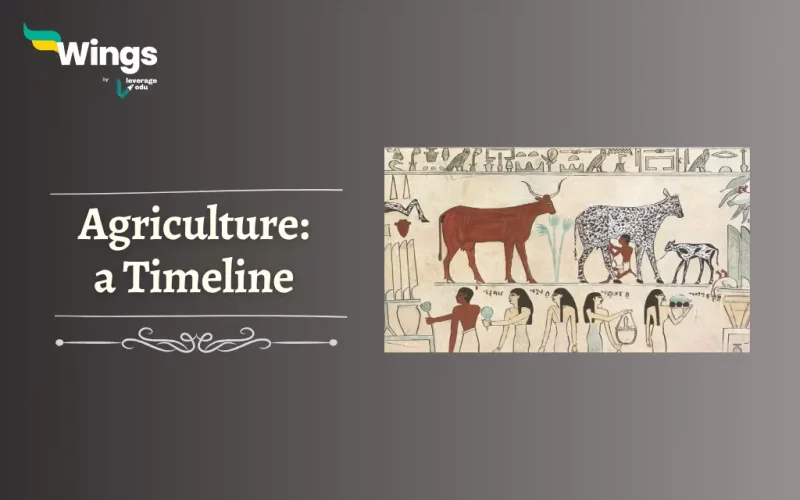Agriculture is the practice of cultivating plants and raising animals for food. It is one of the most important human activities, as it provides us with the food we need to survive. But when did agriculture begin, do you know the timeline of agriculture?
The story of agriculture is a tale as old as humanity itself. Moreover, it represents the pivotal moment when our ancestors transitioned from nomadic hunting and gathering to settled farming. In this blog, we embark on a journey through time to explore the fascinating timeline of when agriculture began.
What is the History of Agriculture?
Furthermore, here is a brief about the major milestones in the timeline of agriculture:
| Timeline of Agriculture | |
| 10,000 BCE | Agriculture begins in the Fertile Crescent. |
| 8,000 BCE | Agriculture reaches Europe. |
| 7,000 BCE | Agriculture reaches Asia |
| 6,000 BCE | Agriculture reaches Africa. |
| 5,000 BCE | Agriculture reaches the Americas |
| 3,000 BCE | The first cities were built. |
| 1,000 BCE | The first civilizations emerged. |
| 1600 CE | The Green Revolution began, which led to a dramatic increase in agricultural productivity. |
| Present | Agriculture is practiced in all parts of the world. |
The Timeline of Agriculture
Our story begins approximately 10,000 years ago in the Fertile Crescent, a region that spans modern-day Iraq, Iran, and Syria. Here, amidst the Tigris and Euphrates rivers, humanity took its first deliberate steps toward agriculture. Moreover, this period marked the cultivation of key crops like wheat, barley, and lentils. Consequently, people discovered that seeds planted in fertile soil produced food and could be harvested for future planting. Thus, this was a monumental realization. So the answer to when did agriculture begin lies 10,000 years ago!
Also Read: The Most Abundant Metal in the Earth Crust is?
The Origins of Agriculture: 9000 BCE to 7000 BCE
As humans developed an understanding of farming, they spread these practices across the globe. In China’s Yellow River Valley, rice and millet farming began around 9000 BCE. Additionally, in the ancient Near East, there was the Neolithic Revolution which is also known as the First Agricultural Revolution. Moreover, in Mesopotamia, the domestication of maize(corn) commenced roughly 7000 BCE. These parallel developments signify the universality of agriculture’s importance to our species.
Egypt and the Nile: 5000 BCE
One of the most iconic agricultural civilizations emerged along the Nile River in ancient Egypt. Around 5000 BCE, the annual flooding of the Nile left behind nutrient-rich silt, perfect for farming. Furthermore, Egyptians cultivated crops like wheat, barley, and flax, setting the stage for the grandeur of their civilization.
The Indus Valley: 3300 BCE
In the Indus Valley, which now spans parts of India and Pakistan, agriculture took root around 3300 BCE. This enigmatic civilization grew wheat, barley, and cotton and developed advanced irrigation systems, showcasing the diversity of agricultural innovation around the world.
Also Read: Things Everyone Must Know About Harappan Civilization (3300-1300 BCE)
Mesoamerica’s Agricultural Victory: 2000 BCE
By 2000 BCE, the Olmec civilization in Mesoamerica introduced cultivation techniques that would lead to the flourishing of the Maya, Aztec, and Inca civilizations. Corn, beans, and squash formed the “Three Sisters” crops, known for their interdependent growth, exemplifying the remarkable adaptability of agriculture to the local environment.
Ancient Innovations (circa 2000-1000 BCE)
Throughout this timeline, various regions made significant agricultural advancements. The use of the plough, the development of crop rotation, and the domestication of new plants and animals continued to shape the agricultural landscape.
Global Diffusion (circa 500 CE)
As trade routes expanded, so did the exchange of agricultural knowledge. Crops like rice, wheat, and barley travelled along the Silk Road and spread across continents, leading to cultural exchanges and diverse farming practices.
From humble beginnings in the Fertile Crescent to the vast empires of Egypt, China, and beyond, the story of agriculture is one of resilience and ingenuity. The development of agriculture had a profound impact on human society.
It allowed people to produce more food than they could gather or hunt, which led to a population boom. It also allowed people to settle in permanent communities, which led to the development of cities and civilizations. It has not only fed humanity for millennia but has also given rise to the complex societies and civilizations we know today. This journey through time reminds us of the deep connection between humans and the earth, as we continue to cultivate, adapt, and innovate in our quest for sustenance and progress.
FAQs
The stages of agriculture begin with the preparation of the soil, then the sowing of the seeds, adding fertilizers and manure, irrigation, harvesting and storage.
The time period of the agricultural year is from July to June.
The Neolithic period is called the period of agriculture.
Agriculture was first stated in 10,000 BCE in the Fertile Crescent.
Relevant Blogs
| Sunga Dynasty | Hoysala Dynasty |
| Yadava Dynasty | Kushan Dynasty |
| Satavahana Dynasty | Kakatiya Dynasty |
| Slave Dynasty | Tughlaq Dynasty |
| Gurjara-Pratihara Dynasty | Haryanka Dynasty |
I hope this blog on When Did Agriculture Begin: A Timeline was a great read. If you want to read more articles like this, you can get Study notes on the Modern History of India here. Also, you can visit our general knowledge page on Indian History!
 One app for all your study abroad needs
One app for all your study abroad needs













